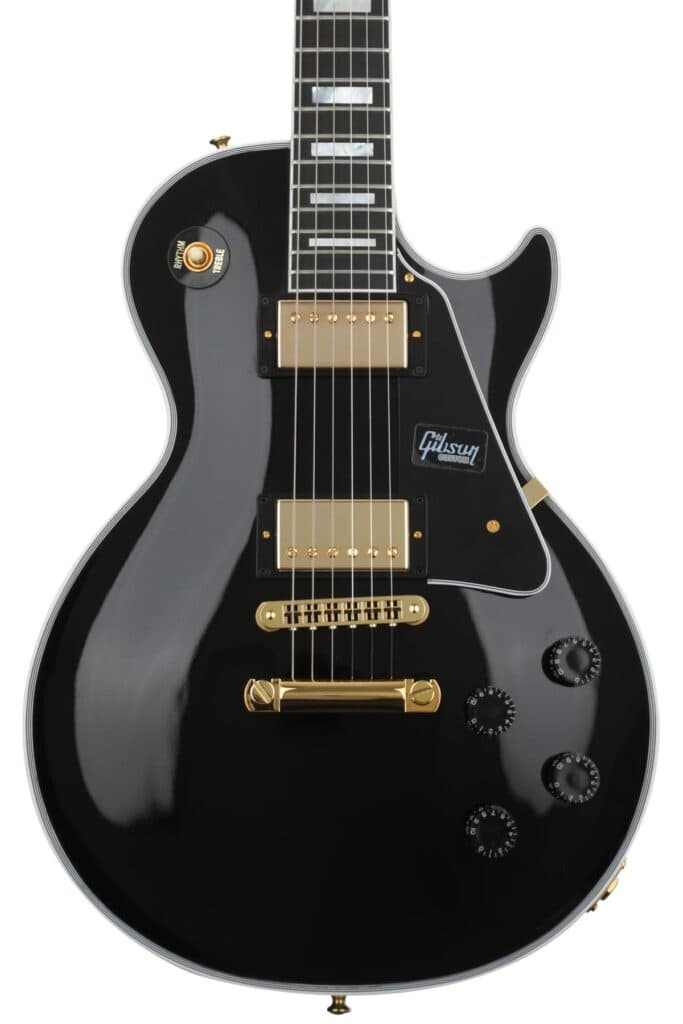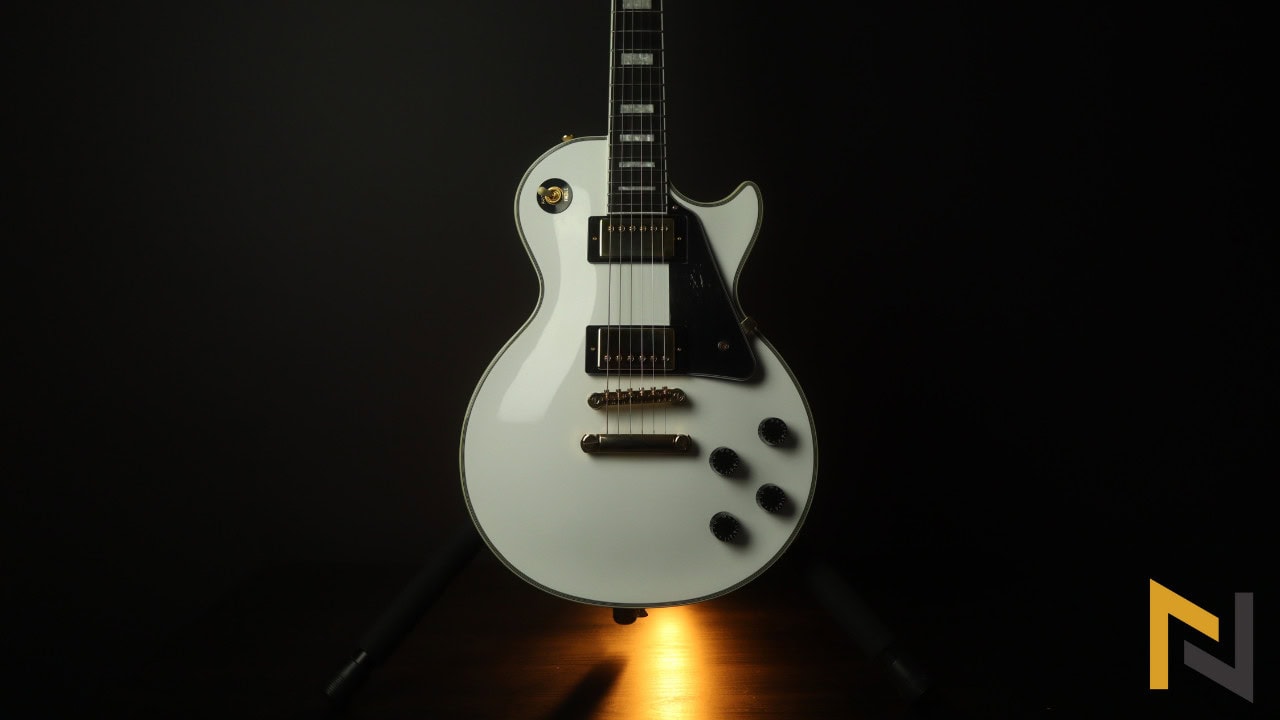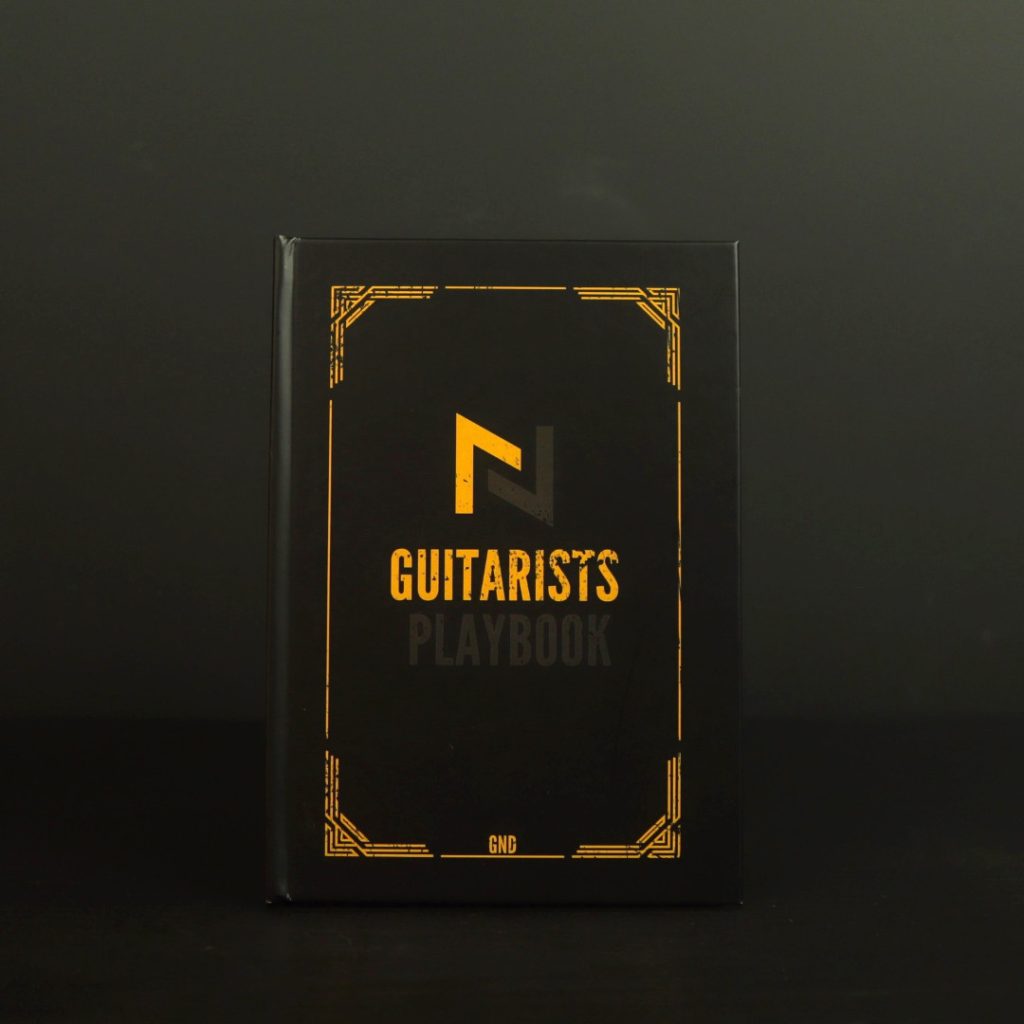If you’ve been drooling over a Les Paul, just know that you’re not the only one.
Players have been swooning over them since their debut in 1952. They have become one of the most recognizable electric guitars in history, and their distinctive design has even been copied and imitated by other companies for decades.

Author: DL Shepherd
Darren has been playing guitar for over 23 years. He fronted the metal band Suddenly Silence in the early 2000’s, and also achieved recognition as an award-winning bluegrass guitarist.
A native of southwestern Virginia, and has shared the stage with many big-name acts from various genres. When he is not playing one of his many guitars, he can be found riding his Harley through the mountains of Virginia.

Editing & Research: Teemu Suomala
I first grabbed the guitar in 2009. I started this website in January 2020 because I couldn’t do window installation anymore due to my health problems. I love guitars and have played dozens and dozens of different guitars through different amps and pedals over the years, and also, building a website interested me, so I decided to just go for it! I got lucky and managed to get awesome people to help me with my website.
I also got lucky because I have you visiting my website right now. Thank you. I do all this for you guys. If you have any recommendations, tips, or feedback, just leave a comment, I would love to chat with you. I have also been fortunate to produce content for several large guitar websites, such as Songsterr, Musicnotes, GuitarGuitar, and Ultimate Guitar.
I spend my spare time exercising and hanging out with my wife and crazy dog (I guess that went the right way…).
But you’ve probably asked yourself: “Should I get an Epiphone Les Paul or a Gibson Les Paul?”
I asked myself this question years ago when I became obsessed with them. I played every one that I could get my hands on before I was able to reach my decision. In my case, I was fortunate enough to own both Gibson and Epiphone models (I still own them both).
Only you will know the answer to that question. Our job is to present you with the facts so that you can make a better decision for yourself. Side by side, they look identical, but some key differences separate them from each other.
In this article, we’ll take a look at those differences as well as the similarities. You’ll soon find out all the information you need to make your decision, so let’s get to it!
Epiphone Les Paul vs. Gibson Les Paul: A Head-to-Head Comparison
Summary (if you’re in a hurry!)
Compare the Key Specs for Both Guitars
| Gibson Les Paul | Epiphone Les Paul | |
| Number of Strings | 6 | 6 |
| Body Type | Solidbody | Solidbody |
| Body Material | Mahogany | Mahogany |
| Top Material | Maple | Maple |
| Body Finish | Nitrocellulose Gloss | Polyurethane Gloss |
| Neck Material | Mahogany | Mahogany |
| Neck Shape | SlimTaper 60’s C | SlimTaper 60’s C |
| Neck Joint | Set Neck | Set Neck |
| Radius | 12” | 12” |
| Fingerboard Material | Rosewood | Indian Laurel |
| Number of Frets | 22, Medium Jumbo | 22, Medium Jumbo |
| Scale Length | 24.75” | 24.75” |
| Nut Width | 1.695” | 1.695” |
| Nut Material | GraphTech | GraphTech |
| Bridge/Tailpiece | ABR-1 Tune-O-Matic with Stopbar | LockTone ABR Tune-O-Matic with Stopbar |
| Controls | 2 x Volume2 x Tone | 2 x Volume2 x Tone |
| Case Included? | Hardshell case included | Sold separately |
Key Similarities Between Epiphone and Gibson Les Paul
| Gibson Les Paul | Epiphone Les Paul | |
| Number of Strings | 6 | 6 |
| Body Type | Solidbody | Solidbody |
| Body Material | Mahogany | Mahogany |
| Top Material | Maple | Maple |
| Neck Material | Mahogany | Mahogany |
| Neck Shape | SlimTaper 60’s C | SlimTaper 60’s C |
| Neck Joint | Set neck | Set neck |
| Radius | 12” | 12” |
| Number of Frets | 22, Medium Jumbo | 22, Medium Jumbo |
| Scale Length | 24.75” | 24.75” |
| Nut Width | 1.695” | 1.695” |
| Nut Material | GraphTech | GraphTech |
| Controls | 2 x Volume2 x Tone | 2 x Volume2 x Tone |
| Weight | Between 9 and 11 lbs. | Between 9 and 11 lbs. |
Key Differences Between Epiphone and Gibson Les Paul
| Gibson Les Paul | Epiphone Les Paul | |
| Body Finish | Nitrocellulose Gloss | Polyurethane Gloss |
| Fingerboard Material | Rosewood | Indian Laurel |
| Bridge/Tailpiece | ABR-1 Tune-O-Matic with Stopbar | LockTone ABR Tune-O-Matic with Stopbar |
| Case Included? | Hardshell case included | Sold separately |
| Manufactured In | USA | China |
Imagine Having The Technique, Gear, and Sound of The GOATS… But Don’t just imagine. Find out.
Joe Satriani
Main Band
Solo Artist
Main Guitar
Ibanez Joe Satriani Signature JS2480
Joe Satriani
| Uniqueness | (4.5) |
| Accuracy | (5.0) |
| Speed | (5.0) |
| Right Hand | (5.0) |
| Techniques | (5.0) |
| Versatility | (3.5) |
| Performance | (4.5) |
| Overall Lead | (5.0) |
| Overall Rhythm | (4.5) |
Tommy Emmanuel
Main Band
Solo Artist
Main Guitar
Maton TE Personal
Tommy Emmanuel
| Uniqueness | (3.5) |
| Accuracy | (4.5) |
| Speed | (5.0) |
| Right Hand | (5.0) |
| Techniques | (5.0) |
| Versatility | (4.0) |
| Performance | (4.0) |
| Overall Lead | (5.0) |
| Overall Rhythm | (5.0) |
Steve Vai
Main Band
Solo Artist
Main Guitar
Ibanez Steve Vai JEM77
Steve Vai
| Uniqueness | (4.5) |
| Accuracy | (5.0) |
| Speed | (5.0) |
| Right Hand | (4.5) |
| Techniques | (5.0) |
| Versatility | (3.0) |
| Performance | (4.5) |
| Overall Lead | (5.0) |
| Overall Rhythm | (4.5) |
Build Quality & Aesthetics
Both Epiphone and Gibson Les Paul models share the iconic Les Paul body shape. It is a single-cutaway shape where the cutaway allows the player access to the higher frets. Most models have a maple cap on top of the mahogany body while some – such as the Les Paul Junior and variants of the Les Paul Special – have no maple cap.

Controls, pickups, and hardware can vary from model to model. Most Les Pauls are equipped with either humbuckers or P90 pickups and feature two tone knobs and two volume knobs.
Epiphone Les Pauls are made at the Epiphone Factory in Qingdao, China. The wood quality is not quite as good as Gibson’s, but it isn’t necessarily bad. Epiphone emphasizes making affordable guitars with a higher quality standard than many competitors. They forego the use of rosewood fingerboards for the much cheaper Indian laurel wood.
They do not use nitrocellulose lacquer like Gibson and use a polyurethane-based finish instead. Polyurethane-based lacquer is cheaper and it is also much faster to spray which results in lower labor costs. You’ll still see some gorgeous finishes on those Pauls though, don’t worry!
They still use mahogany instead of cheaper substitutions like many of their competitors. This means that the Epiphone Les Pauls will weigh roughly the same as the Gibson Les Pauls, which is around 9 to 11 lbs.

Gibson Les Paul models are made at the Gibson Factory in Nashville, Tennessee, USA. They use premium cuts of mahogany, maple, and rosewood to construct their guitars. Woods such as rosewood are highly regulated in the United States and can therefore be expensive to use.
Gibson uses nitrocellulose lacquer to finish their guitars. This type of lacquer is more expensive and takes more time to spray than polyurethane-based lacquer. This adds both material and labor costs to the guitar.
Speaking of labor costs, that is one of the major contributing factors to the high prices that most Gibson guitars command. Gibson pays USA workers much higher wages which results in the price of the guitars being higher. Epiphone workers do not get paid nearly as much and therefore the cost of their guitars is more affordable.
Hardware Quality

When it comes to hardware, Gibson cuts no corners. They use premium hardware that, according to a Gibson representative I spoke with, is made in the USA (the only exception being Grover tuners which are made in Taiwan). This hardware includes:
- ABR-1 Tune-O-Matic bridge with a stopbar tailpiece.
- GraphTech nut.
- Gibson-branded knobs and electronics.
- Gibson Deluxe Tuners or Grover Tuners.
Epiphone uses cheaper hardware, but it is still of great quality. At first glance, the hardware appears to be the same as Gibson. Upon closer inspection, you’ll see differences in the quality of the bridge, tuners, and electronics. It is lower in quality overall, however, the nut is still GraphTech.
Playability And Neck Profile

You’ll find both models exceptionally playable with proper setups. They both have a 24.75” scale length and a comfortable SlimTaper neck profile. This profile is great for playing both chords and solos, and it lends itself well to nearly all genres of music.
The frets are medium jumbo. This fret size allows for comfortable fretting with minimal effort needed to finger a note. The fretboard of the Epiphone Les Paul is made from Indian laurel while the fretboard for the Gibson Les Paul is made from rosewood.
The neck of the Epiphone Les Paul feels a bit slimmer than the Gibson Les Paul – at least to my hands. I have always thought that there was something different about the profile of the Epiphone Les Paul. It just feels like there is less wood there. I prefer the feel of a Gibson Les Paul because of this.
I also feel that Gibsons come with a better factory setup and therefore play better right out of the box. When an Epiphone Les Paul is set up properly, however, it plays just as well as the Gibson. The question, “Which one plays better?” is hard to answer here because it depends on how you like the feel of the neck. I strongly encourage everyone to play both models to find out which one is for you.
| Gibson Les Paul | Epiphone Les Paul | |
| Neck Shape | SlimTaper C | SlimTaper C |
| Neck Material | Mahogany | Mahogany |
| Scale Length | 24.75” | 24.75” |
| Radius | 12” | 12” |
| Fingerboard Material | Rosewood | Indian laurel |
| Fret Size | Medium-jumbo | Medium-jumbo |
| Number of Frets | 22 | 22 |
Pickups & Sound Comparison
Here’s where things start to separate a bit more: The sound test. There is a major difference in sound between the two. But first, we have to see what the major differences are as far as the electronics are concerned.
- The Gibson Les Paul is equipped with pickups that are made at the Gibson Pickup Shop in Nashville, Tennessee. These pickups are mostly hand-wound, and a lot of time and care is put into their construction.
- Epiphone pickups are mass-produced in China. They are made from cheaper parts with less attention to detail on the overall construction.
- Pickups of the latest higher-end Epiphone Les Paul Customs are Gibson USA pickups.
Gibson pickups sound much more vibrant than Epiphone pickups. The bass response is tight with focused mids and a great high-end sparkle. Epiphone pickups, in comparison, sound muffled. The tone has more low mids that are loose which makes it sound like you have a blanket over your amp.
Epiphone pickups lack the definition and sparkle that Gibson pickups possess. This is very apparent whether you are playing with distortion/overdrive or just a clean channel.
For real – there is no comparison between the two. The Gibson Les Paul blows the Epiphone out of the water when it comes to great tone.
The Gibson Les Paul would be great for rock, blues, jazz, and even heavy metal if paired with the right amplifier. The Epiphone would be great for punk rock, hard rock, or metal as long as there wasn’t an extreme need for single-note definition.
You honestly couldn’t expect them to sound the same, do you? How would Gibson sell their guitars if they made a superior import?
Price Differences
I’m sure that everyone who has looked at the price of a Gibson Les Paul has experienced just a little (or maybe a lot) of sticker shock. Some of them fetch thousands of dollars. Epiphone Les Pauls tend to be much easier on the wallet. This is because their prices are very affordable compared to Gibson.
On paper, both guitars look nearly identical.
They really aren’t that different – until you pick them up and plug them in.
You’ll immediately hear the quality difference between the two guitars, and the Epiphone models even feel slightly different.
There are certain benefits to each one. A Gibson Les Paul will sound and play better right out of the box whereas an Epiphone will require some modding to get it to sound like a Gibson. This would require you to replace the pickups and electronics with Gibson parts. The added benefit to a Gibson Les Paul is that it will hold its value much better than an Epiphone Les Paul.
The fact that they hold their value better is an excellent benefit because you are more likely to get your money back (or a large portion of it) if you ever decide to sell it. It is much harder to do this with an Epiphone Les Paul.
Epiphone Les Pauls are great for players who are learning guitar or intermediate players who are looking to upgrade a little. Gibson Les Pauls are great for more advanced players who want a serious axe that will hold its value (and maybe even gain value) in the years to come.
Here is a list of Les Paul models that are available from both Gibson and Epiphone.
- Les Paul Special.
- Les Paul Junior.
- Les Paul Studio.
- Les Paul Classic.
- Les Paul Standard.
- Les Paul Modern.
- Les Paul Custom.
Epiphone Les Paul vs. Gibson Les Paul – Pros and Cons

Gibson Les Paul
| Pros | Cons |
| Better factory setup than Epiphone. | Expensive |
| Vibrant, defined sound that is great for nearly all genres. | Heavy |
| Made of premium materials in the USA. | Possible quality control issues. |
| Made with more attention to detail. | |
| Hold their value. |
Epiphone Les Paul Pros
| Pros | Cons |
| Much more affordable than Gibson. | Do not hold their value. |
| Made of many of the same tonewoods as Gibsons. | Made with less attention to detail. |
| Look nearly identical to their Gibson counterparts. | Sometimes poorly set up from the factory. |
| Muffled, undefined tone. | |
| Heavy. |
Epiphone vs. Gibson Les Paul: Which One Should You Buy?

It all comes down to what you want out of your guitar. If you are looking for a great gigging guitar, both of them will fit the bill. They both play well too. The big factors you should consider are the cost and the sound.
If you don’t want to sound dull and undefined, then you definitely want to get a Gibson Les Paul. You should also get a Gibson if you want a guitar that is going to hold its value over the years.
If resale value isn’t important to you, then an Epiphone will suit you just fine. Keep in mind, however, that you might have to do some modifications to it to make it sound better.
My Favorite Les Paul Recommendations
The cheapest Gibson Les Paul at this time is $1499. If you want a budget Gibson, then you’ll want to check out the Gibson Les Paul Modern Lite (I like the Cardinal Red).
For those who are really on a budget, I recommend checking out the Epiphone Les Paul Studio E1. It’s a great axe at a great price point.
Those who are looking for a more substantial axe will appreciate the Gibson Les Paul Standard 60s Plain Top. If you require a thicker neck, you want to go with the Gibson Les Paul Standard 50s Plain Top. Epiphone fans can step up to an Epiphone Les Paul Modern.
If you want a high-quality axe that showcases the best of what Gibson has to offer (and you’re willing to pay up for it), then a Gibson Les Paul Standard 60s AAA Top will give you that. You just can’t go wrong with a AAA maple top! For those wanting a sharp-looking Epiphone, check out the Epiphone Les Paul Custom in Viper Blue.
Famous Epiphone and Gibson Les Paul Players
Gibson Players
- Les Paul
- Gary Moore
- Zakk Wylde
- Joe Perry
- Jimmy Page
- Billy Joe Armstrong
- Randy Rhoads
- Pete Townsend
- Ace Frehley
Famous Epiphone Les Paul Players
- Skyler Kjelset
- Ace Frehley
- Billy Gibbons
- Matt Heafy
- Robb Flynn
- Noel Gallagher
- Paul Weller
- Nick Valensi
Used Gibson Les Paul or A Brand New Epiphone Les Paul?

So, what about used Gibsons? Should you get a used Gibson Les Paul or a brand-new Epiphone? Let’s take a closer look.
One of the benefits of buying a used Gibson is that they are usually cared for by the previous owners. Sure, you’ll see some trashed Gibsons on the used market, but even they hold their values fairly well. It may be hard to find a used Gibson that is priced close to the most expensive new Epiphone Les Paul.
If you’re just looking to get a used Gibson to save money, you’ll probably be out of luck. If this is the case, then you’re better off getting a brand-new Epiphone Les Paul. It will be the most affordable of the two.
There are only two times that I recommend getting a used Gibson and those are:
- If you’re already sure you want a Gibson and want to save a few bucks.
- If you want a model that they no longer make.
There isn’t a benefit to buying a used Gibson if you are simply wanting to get the most bang for your buck.
Conclusion
Deciding on which Les Paul model you want can be frustrating because there are a lot of options to weigh. However, just keep in mind that you’ll be getting a quality instrument either way – especially if you are deciding between a cheaper Gibson and a high-end Epiphone.
The great thing about it is that Epiphone’s quality has improved by leaps and bounds over the past 20 years. When I was younger, Epiphone Les Pauls were considered low-grade starter guitars. These days, players have gained a new respect for the brand. Some even say that the quality rivals Gibson since they have had some quality control issues in recent years.
The fact that Epiphone has closed the quality gap over the years is a good thing – you can now get a higher-quality guitar for much less money. I always tell players to play each one to make sure that they are getting exactly what they want.
I think there will always be a sense of prestige that comes from owning a Les Paul. It is a guitar that many players work very hard to own. They’re a piece of America, and that’s always going to be a special thing.
FAQs
Is The Epiphone Les Paul As Good As The Gibson Les Paul?
They are very much the same in many ways, however, the Epiphone Les Paul falls short when it comes to sound and quality.
Why Are Epiphone Guitars So Much Cheaper Than Gibson?
Epiphone guitars are cheaper than Gibson because they use cheaper materials and use cheaper labor. They have less attention to detail than Gibson guitars and are made in China instead of the USA.
Can Epiphone Les Paul Sound Like Gibson?
Yes, but it will take some work. I have heard Epiphone Les Pauls sound just like their Gibson counterparts when Gibson pickups were installed.
Can You Replace Epiphone Les Paul Pickups With Gibson Pickups?
Yes, you can replace the pickups on an Epiphone Les Paul with pickups from Gibson.
What Genres Is The Les Paul Good For?
Les Paul guitars are great for:
-Rock
-Metal
-Reggae
-Blues
-Jazz
Why Are Les Pauls So Heavy?
This is because they are made from mahogany. Mahogany is a dense wood with a lot of weight. Adding a maple cap also adds weight. It’s the overall construction that makes them so heavy.
Should I Get A Les Paul As A Beginner?
Absolutely! Les Pauls make great beginner guitars. You might want to stick with an Epiphone if you’re just starting.
















